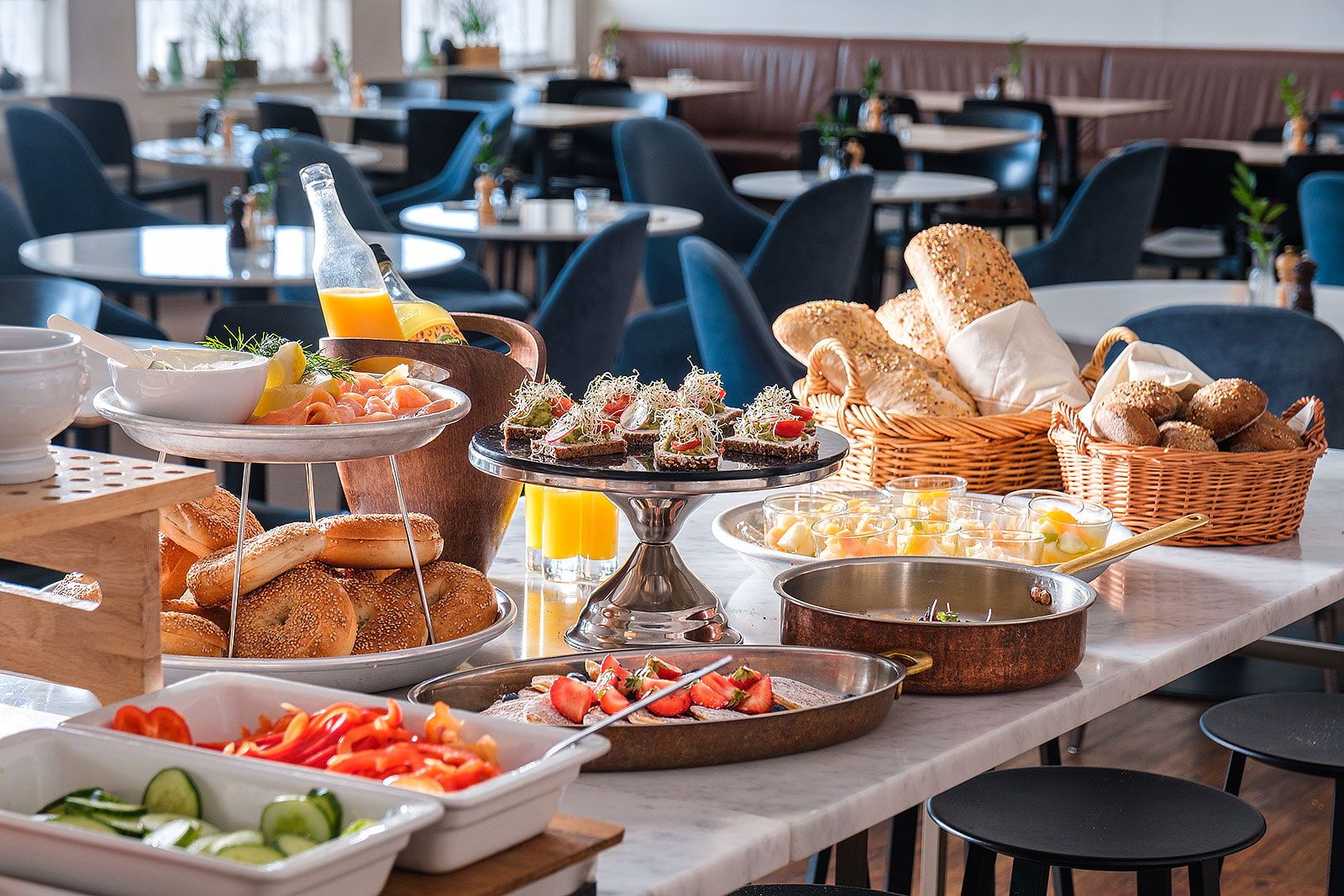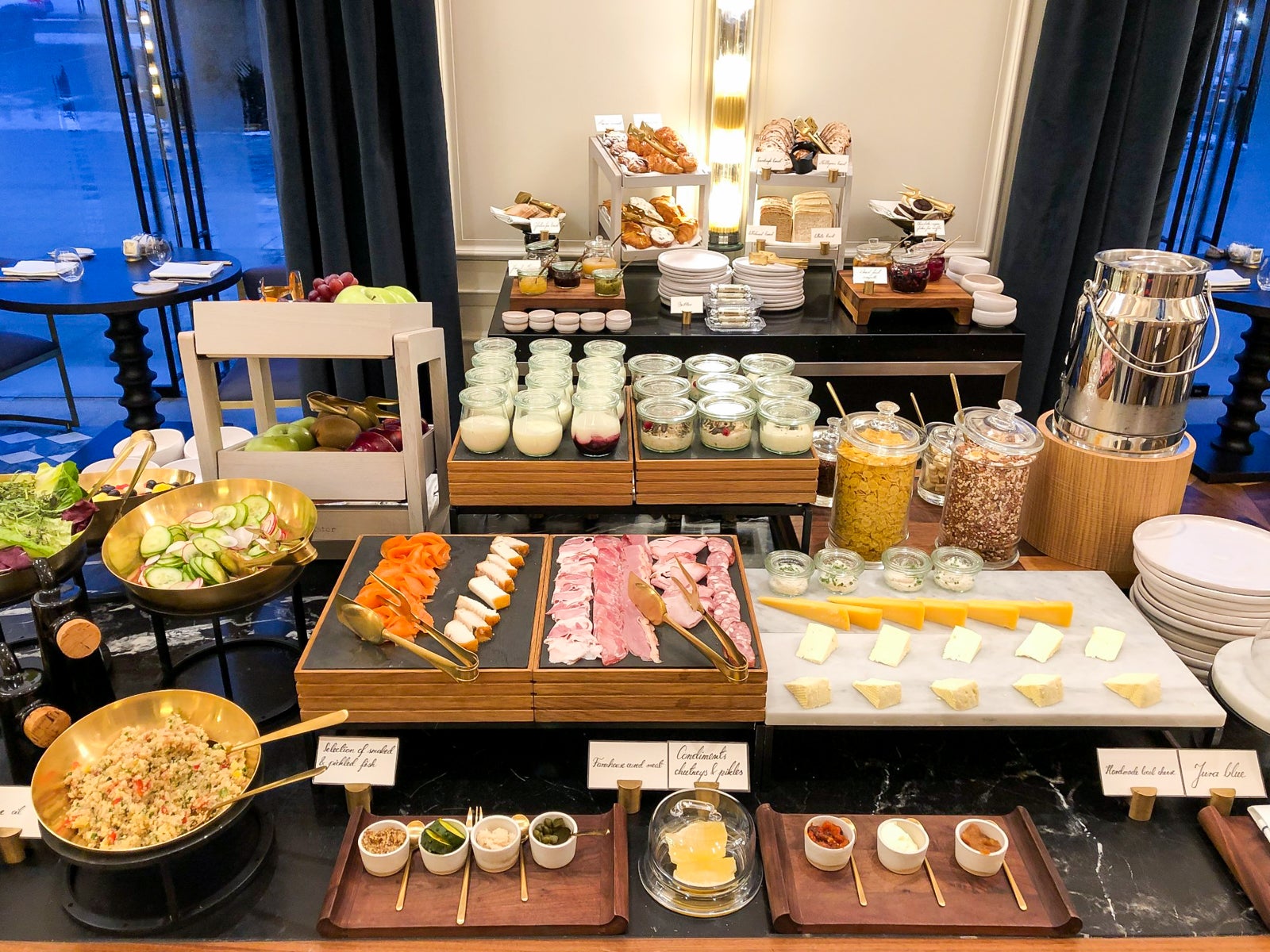Hotels with Free Breakfast A Comprehensive Guide
Hotels with free breakfast are a popular choice for travelers, offering a convenient and cost-effective way to start the day. This guide delves into the multifaceted world of complimentary hotel breakfasts, exploring everything from the variety and quality of food offered to the impact on hotel bookings and the sustainability of these programs. We’ll examine the differences between budget and luxury hotel offerings, analyze customer reviews, and investigate the marketing strategies employed to highlight this valuable amenity.
Ultimately, we aim to provide a complete understanding of the free breakfast experience for both hotels and guests.
From the humble continental breakfast to elaborate buffets, the free breakfast offered by hotels varies significantly. This variation is influenced by factors such as hotel star rating, location, and target clientele. We will explore the typical breakfast offerings, comparing and contrasting the experiences offered at different price points and considering the dietary needs of a diverse range of guests.
The impact of these offerings on hotel bookings and customer satisfaction will also be analyzed, shedding light on the significant role free breakfast plays in the hospitality industry.
Hotel Breakfast Variety: Hotels With Free Breakfast

The availability of a complimentary breakfast is a significant factor for many travelers when choosing a hotel. The variety and quality of this breakfast, however, can differ greatly depending on the hotel’s price point and target audience. Understanding these differences can help travelers make informed decisions based on their preferences and budget.
Free breakfast offerings typically range from a basic continental breakfast to a more extensive hot buffet. The basic continental breakfast usually includes items such as cereal, toast, pastries, fruit, and coffee or juice. More elaborate options may add yogurt, hard-boiled eggs, and sometimes even hot items like scrambled eggs, bacon, or sausage.
Budget Hotel Breakfast Options
Budget hotels generally offer a more limited selection of breakfast items. This often consists of a continental breakfast with pre-packaged pastries, cereal, instant coffee, and juice boxes. Hot food is rarely offered, and the overall presentation may be less refined. While the selection is smaller, the goal is to provide a convenient and reasonably filling meal before guests begin their day.
Examples include simple cereals like corn flakes and frosted flakes, white bread toast, and individually wrapped pastries like muffins or croissants. Fruit might be limited to apples or bananas.
Luxury Hotel Breakfast Options
Luxury hotels, on the other hand, typically offer a significantly more extensive and sophisticated breakfast experience. Expect a wide array of hot and cold options, including made-to-order omelets, fresh fruit platters, various pastries from local bakeries, smoked salmon, cheeses, and a selection of freshly squeezed juices. The ambiance is also typically more upscale, with a dedicated breakfast room or restaurant featuring elegant décor and attentive service.
For instance, a luxury hotel might offer a wide selection of artisanal breads, exotic fruits, and even a carving station with roasted meats.
Breakfast Options by Dietary Restriction
The following table Artikels common breakfast items categorized by dietary restrictions, demonstrating the potential variety offered, though specific offerings will vary widely between hotels.
| Vegetarian | Vegan | Gluten-Free | Common to All |
|---|---|---|---|
| Yogurt (plain, unsweetened) | Fruit salad | Gluten-free bread/toast | Coffee |
| Scrambled eggs (check for butter/dairy) | Oatmeal (check for added sugar/dairy) | Gluten-free cereal | Juice |
| Fruit salad | Tofu scramble (if offered) | Plain yogurt (check for added sugar) | Fruit (apples, bananas, etc.) |
| Various pastries (check ingredients) | Vegan sausage (if offered) | Eggs | Water |
Breakfast Quality and Customer Reviews

The quality of a hotel’s complimentary breakfast significantly impacts the overall guest experience. Positive reviews can boost a hotel’s reputation and attract more bookings, while negative feedback can deter potential guests. Understanding what contributes to both positive and negative experiences is crucial for hotels aiming to provide a satisfying breakfast service. Analyzing customer reviews provides valuable insights into areas needing improvement and aspects that already excel.A hotel’s free breakfast can be a make-or-break factor for many travelers.
Freshness, variety, and service quality all play significant roles in shaping a guest’s perception. A positive experience might be described as having a wide selection of fresh, high-quality food, served by friendly and attentive staff in a clean and well-maintained breakfast area. Conversely, a negative experience might involve stale pastries, limited options, long queues, and unhelpful staff in a disorganized setting.
Positive and Negative Customer Review Examples
Positive reviews often highlight the freshness of the food, the variety of choices, and the attentiveness of the staff. For example, a guest might comment, “The breakfast was surprisingly good! Everything was fresh and delicious, and there was a wide selection of hot and cold items.” Another might praise the service, stating, “The staff were incredibly friendly and helpful, keeping the buffet well-stocked and clean throughout the morning.” In contrast, negative reviews might describe stale bread, undercooked eggs, or a lack of vegetarian or vegan options.
A common complaint involves long wait times for food or tables, or staff who are inattentive or unhelpful. For instance, a guest might write, “The breakfast was a huge disappointment. The fruit was old, the bacon was undercooked, and there were barely any clean tables.” Another might state, “The staff seemed overwhelmed and didn’t bother to replenish the food items, resulting in a very unpleasant experience.”
Factors Contributing to Breakfast Experience
Several factors significantly influence a guest’s perception of a hotel’s free breakfast. The freshness of the food is paramount; stale pastries or wilted fruit immediately create a negative impression. Variety is another key factor. Guests appreciate a range of options, catering to different dietary needs and preferences, including hot and cold items, fruits, cereals, and beverages. The quality of the food itself is crucial; poorly prepared or low-quality ingredients will lead to dissatisfaction.
Finally, the service provided plays a vital role. Friendly, efficient staff who keep the breakfast area clean and well-stocked contribute to a positive experience.
Key Aspects of Hotel Breakfast Evaluation
The following five key aspects are consistently highlighted by customers when evaluating a hotel’s free breakfast:
- Food Freshness: Is the food fresh and appealing, or does it appear stale or old?
- Food Variety: Does the breakfast offer a sufficient range of options to cater to various tastes and dietary needs?
- Food Quality: Is the food well-prepared and of good quality, or does it taste bland or poorly made?
- Cleanliness and Ambiance: Is the breakfast area clean, well-maintained, and inviting?
- Service Quality: Are the staff friendly, helpful, and efficient in replenishing food and clearing tables?
Impact of Free Breakfast on Hotel Bookings
The inclusion of a complimentary breakfast significantly impacts hotel bookings, acting as a powerful incentive for many travelers. This perk influences not only the decision to book but also the price point a guest is willing to pay, directly affecting a hotel’s occupancy rates and overall revenue. Understanding this influence is crucial for effective hotel marketing and pricing strategies.Free breakfast acts as a significant value-added service, particularly appealing to budget-conscious travelers and families.
The cost savings associated with skipping a morning meal can be substantial, especially for larger groups. This added value can be a decisive factor when comparing similar hotels at comparable price points, leading travelers to choose the hotel offering the complimentary breakfast.
Demographics Prioritizing Free Breakfast
The demographic most likely to prioritize free breakfast when choosing a hotel includes families with children, budget travelers, and those on business trips who prefer the convenience of an on-site meal. Families often find the cost of feeding multiple people at breakfast a considerable expense, making a free breakfast a highly attractive feature. Budget travelers, prioritizing affordability, see free breakfast as a way to reduce overall travel costs.
Business travelers frequently appreciate the time-saving aspect, allowing them to grab a quick breakfast before heading to meetings or other commitments.
Comparison of Hotel Booking Rates
A direct comparison of hotel booking rates is difficult without access to proprietary booking data. However, anecdotal evidence and general market trends suggest that hotels offering free breakfast often command slightly higher average daily rates (ADR) than comparable hotels without this amenity. This is because hotels can justify a slightly higher price, knowing the added value of free breakfast will attract a segment of the market willing to pay a premium.
For instance, a hypothetical comparison might show a hotel with free breakfast averaging $120 per night versus a similar hotel without free breakfast averaging $110. The $10 difference reflects the perceived value of the complimentary breakfast, demonstrating its impact on pricing power. This price difference varies greatly depending on location, hotel brand, and overall market conditions.
Marketing and Advertising of Free Breakfast
Hotels employ a variety of marketing and advertising strategies to effectively communicate the value of their complimentary breakfast offerings to potential guests. These strategies aim to attract budget-conscious travelers, families, and business professionals alike, highlighting the convenience and cost savings associated with a free morning meal. Effective communication is key to translating this benefit into increased bookings.Hotels leverage several channels to advertise their free breakfast.
Website and social media platforms play a significant role, showcasing enticing images and detailed descriptions of the breakfast spread. Online travel agencies (OTAs) like Expedia and Booking.com also feature breakfast as a key amenity filter, allowing potential guests to easily identify hotels that include this perk. Email marketing campaigns can target specific demographics, while print advertising in travel magazines and local publications may also be utilized, depending on the hotel’s target audience and marketing budget.
Marketing Strategies to Highlight Free Breakfast Value
Several marketing strategies emphasize the value proposition of a complimentary breakfast. These go beyond simply stating “free breakfast” and focus on conveying the experience and benefits. Hotels often highlight the variety of food choices, emphasizing fresh ingredients and healthy options. They might showcase the convenience of starting the day without the need for an external breakfast purchase, especially beneficial for busy travelers.
The cost savings compared to purchasing breakfast elsewhere are also frequently emphasized, particularly during peak seasons or in high-cost areas. Furthermore, the ambience of the breakfast area—whether it’s a bright and airy dining room or a cozy breakfast nook—is often used to create a positive association with the hotel’s offering. Family-friendly hotels may emphasize the availability of children’s menu items or kid-friendly spaces within the breakfast area.
Imagery Effectively Showcasing Free Breakfast, Hotels with free breakfast
High-quality imagery is crucial for effectively showcasing the appeal of a hotel’s free breakfast. Visually compelling photos can significantly influence a potential guest’s decision-making process. Here are three distinct image descriptions designed to highlight different aspects of a complimentary breakfast experience:
Image 1: The Abundant Buffet
This image features a wide shot of a bustling breakfast buffet, overflowing with a variety of fresh fruits, pastries, and hot breakfast items. The vibrant colors of the food, from the ripe berries to the golden-brown pancakes, are clearly visible. Guests are subtly visible in the background, enjoying their meals in a bright, airy dining room with large windows, suggesting a welcoming and comfortable atmosphere.
The overall impression is one of abundance and choice, conveying the value and quality of the breakfast offering.
Image 2: A Cozy Corner Breakfast
This image focuses on a more intimate setting, showcasing a couple enjoying a quiet breakfast in a cozy corner of the breakfast area. The focus is on the details: a steaming cup of coffee, a plate of fresh fruit and yogurt, and a newspaper casually placed on the table. The warm lighting and comfortable seating create a sense of relaxation and intimacy, appealing to guests seeking a peaceful start to their day.
The image emphasizes the personal and enjoyable aspect of the free breakfast.
Image 3: Family Fun at Breakfast
This image depicts a happy family—parents and children—seated at a table, enjoying their breakfast. The children are happily engaged with their pancakes and juice, while the parents are relaxed and engaged in conversation. The image is bright and cheerful, with playful elements subtly incorporated, such as a cartoon character on a cereal box or a child’s drawing on the table.
This image directly targets families, emphasizing the convenience and enjoyable aspect of a free breakfast for the whole family.
Sustainability and Ethical Considerations of Free Breakfast

Offering a complimentary breakfast is a popular way for hotels to attract guests, but it’s crucial to consider the environmental and ethical implications of this seemingly simple amenity. The scale of food preparation and consumption in a hotel, particularly a large one, can have a significant impact on resource use and waste generation. Understanding and mitigating these impacts is vital for responsible hotel operations.Providing a free breakfast involves a complex interplay of resource consumption and waste generation.
The environmental impact stems from various stages, including food production, transportation, preparation, and consumption. Food waste is a major contributor, with uneaten items often ending up in landfills, contributing to greenhouse gas emissions and environmental pollution. Sourcing practices also play a crucial role; reliance on non-sustainable agriculture, long-distance transportation of ingredients, and packaging materials all add to the environmental footprint.
Ethical considerations extend to ensuring fair labor practices throughout the supply chain and guaranteeing the quality and safety of the food provided. Hotels must strive for transparency and accountability in their sourcing and waste management practices to ensure their free breakfast offering is both appealing to guests and responsible to the environment.
Environmental Impact of Free Breakfast
The environmental impact of a hotel’s free breakfast program is multifaceted. Food waste represents a significant portion of this impact. Buffet-style breakfasts, while popular, often lead to substantial food waste as guests take more than they can consume. The energy used to produce, transport, and prepare the food, along with the water used in the process, further contribute to the overall environmental footprint.
For example, a large hotel serving a breakfast buffet to 100 guests daily could generate significant amounts of food waste, requiring extra resources for disposal and potentially increasing landfill contributions. The choice of ingredients also matters; locally sourced, seasonal produce has a lower carbon footprint compared to imported items that require extensive transportation. The packaging used for breakfast items, such as single-use containers and cutlery, adds to the waste stream.
Reducing the reliance on single-use plastics and employing compostable alternatives can lessen the environmental impact.
Ethical Sourcing of Breakfast Ingredients
Ethical sourcing is paramount in ensuring the free breakfast program aligns with responsible business practices. This involves prioritizing ingredients sourced from local farms and suppliers who adhere to fair labor standards and sustainable agricultural practices. Choosing organic or sustainably produced products minimizes the use of harmful pesticides and fertilizers, protecting biodiversity and soil health. Transparency in sourcing is also crucial; guests are increasingly interested in knowing where their food comes from and how it was produced.
Hotels should clearly communicate their sourcing practices to build trust and demonstrate their commitment to ethical sourcing. For example, a hotel could highlight its partnerships with local farmers, emphasizing the freshness and sustainability of its ingredients. This transparency can attract environmentally and ethically conscious travelers.
Strategies for Sustainable Free Breakfast Programs
Hotels can implement several strategies to enhance the sustainability of their free breakfast programs.
- Reduce Food Waste: Implement smaller portion sizes, offer a la carte options alongside buffet choices, and donate leftover food to local charities or food banks.
- Source Locally and Seasonally: Partner with local farmers and suppliers to reduce transportation costs and environmental impact. Prioritize seasonal produce to minimize the need for energy-intensive storage and transportation.
- Minimize Packaging: Reduce reliance on single-use plastics by offering reusable containers and cutlery, and using compostable alternatives where single-use items are necessary.
- Promote Sustainable Practices: Educate guests about the hotel’s sustainability initiatives and encourage them to reduce food waste and make conscious choices.
- Invest in Energy-Efficient Equipment: Utilize energy-efficient cooking appliances and refrigeration systems to reduce energy consumption.
- Implement a Composting Program: Compost food scraps and other organic waste to reduce landfill waste and create valuable fertilizer.
- Monitor and Track Progress: Regularly measure and track food waste, energy consumption, and other environmental metrics to identify areas for improvement.
Last Recap
In conclusion, the seemingly simple offering of a free hotel breakfast is a complex issue with wide-ranging implications. From its influence on booking decisions and customer satisfaction to its environmental impact and ethical considerations regarding sourcing and waste reduction, the complimentary breakfast reveals much about the hotel industry’s commitment to guest experience and responsible practices. Understanding the nuances of this amenity allows both travelers and hoteliers to make informed choices, leading to a more enjoyable and sustainable travel experience for all.
FAQ Compilation
What time is breakfast typically served?
Breakfast service times vary by hotel, but generally fall between 6:00 AM and 10:00 AM. It’s always best to check with the hotel directly to confirm their specific hours.
Are there usually options for children?
Many hotels offer child-friendly breakfast options, such as cereal, milk, fruit, and sometimes even kid-sized portions of adult items. Again, confirming with the hotel is advisable.
Can I get a to-go breakfast if I have an early departure?
Some hotels offer to-go breakfast bags or boxes for guests with early departures. This is a service that should be requested in advance.
What if I have allergies or dietary restrictions?
Most hotels are accommodating to dietary restrictions. It’s crucial to inform the hotel staff of any allergies or special dietary needs upon check-in or in advance to ensure appropriate options are available.
Is the free breakfast always included in the room rate, or is there an additional charge?
Typically, a free breakfast is included in the advertised room rate, but it is always advisable to double-check the details on the hotel’s website or booking confirmation to avoid any unexpected charges.